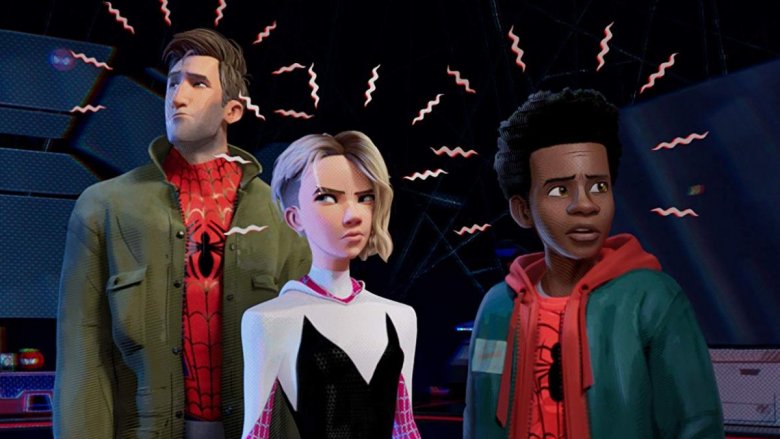Spider-Verse: Directors Talk Sequel Plans, Original Script
Our return trip to the Spider-Verse won't be a simple rehash.
Bob Persichetti, Peter Ramsay, and Rodney Rothman — the directing trio behind the Oscar-winning animated smash Spider-Man: Into the Spider-Verse — recently sat down with Collider to discuss their thoughts on the sequel, and also to give a little insight as to how a rather unwieldy script took shape.
According to the directors, the first draft of the flick's screenplay clocked in right around 160 pages, which was just never going to work. As a general rule of thumb, a single page of a screenplay generally covers about a minute of screen time, which means that Spider-Verse may have pushed up against the three-hour mark had the filmmakers stuck to their original vision.
"Yeah, we had a three hour movie," Persichetti deadpanned. "We had this real, sort of recurring, almost spiral of a first act, that was like 75 minutes... we are big fans [of a] long first act generally as far as... texture, detail, introduction of characters and situations, but early versions of the movie took that to an unnecessary extreme." Rothman chimed in to offer an example of the type of filler that never made it to the screen, saying, "In that version... Miles' roommate played a much larger role. We kind of carved that out."
And an admirable job they did, considering that the finished film came in at just under two hours, and plays like about thirty minutes. The trio went on to offer details on how the film's incredibly unique visual sensibility was informed by the story, and why the sequel — which is already in development — won't necessarily look like more of the same.
Referring to the obvious temptation to simply mimic the first film's visual style, Rothman said, "It's a tightrope... I would say that the goal is to... deepen both sides of that equation, you know? To deepen the emotional storytelling, and... the story about Miles and his family, just deepen all that, and deepen the sense of experimentation and pushing boundaries visually, and I'm sure there'll be tethers to what we just did, but... we feel super encouraged by how people responded to the risks that we took. We didn't know if they were gonna work or not, so I think everyone feels emboldened."
Persichetti elaborated, "I think it becomes about [continuing] the philosophy of the way the movie got made, as opposed to [continuing to make] movies that look the same. Because... every choice we made, in pushing the boundaries on the animation style and the visual stylization, even the narrative stylization, all of that stuff was a choice that felt like it was born out of the needs [of] the story and the movie narratively. And obviously, it all compounded to make something feel really cohesive and resonant. If you can take that philosophy forward, that's the win."
Of course, the big win was the Oscar for Best Animated Feature, which Into the Spider-Verse took home on Sunday night. It's been called the best Spider-Man movie ever, if not the best superhero film ever — and that is thanks not only to its brilliant story (based on the Spider-Verse event by Marvel writer Dan Slott), but to a meticulously rendered style conceived with the express purpose of telling that story in the most compelling way possible.
To hear these guys tell it, the next chapter (which is thought to be centered on the burgeoning relationship between Miles Morales and Gwen Stacy) will likely be just as visually innovative, just not in precisely the same way. For that matter, the spin-off picture which is also in the works — which is set to introduce such iconic characters as Cindy Moon (AKA Silk, also created by Slott) and Jessica Drew, the Spider-Woman — will likely carry its own unique visual imprint to tell its female-centric story.
Let's face it, true believers: with no fewer than three cinematic iterations of Spidey already having been introduced, Spider-Man: Into the Spider-Verse was a pretty big gamble. It's safe to say that Sony Pictures Animation came up a resounding winner, and with this savvy trio of directors back on board for another round, it looks like the house will continue to smile upon the studio.
Spider-Verse is available for purchase on multiple digital platforms as of today; it's set to drop on Blu Ray and DVD on March 19.
